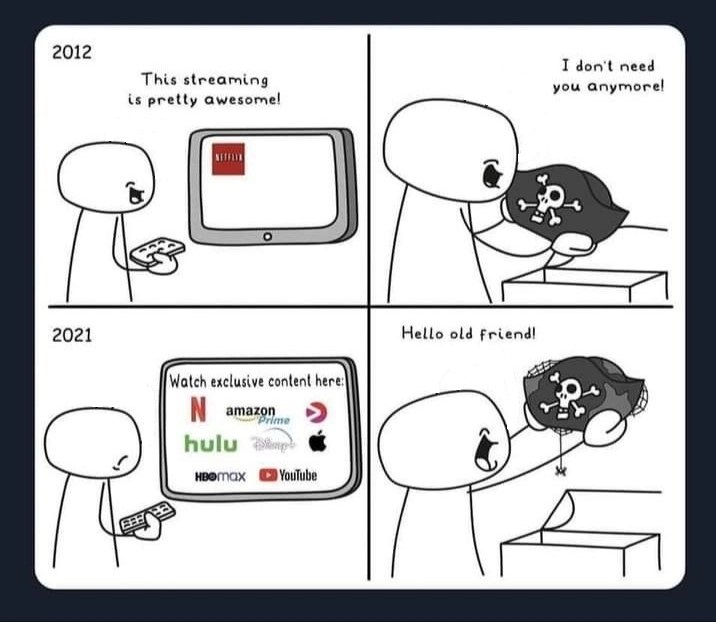That guys’ as well.
- 6 Posts
- 49 Comments
Just try, what is the worst that could happen? Hehe-- [sound of breaking bones and rupturing organs]

Oni would be great, problem is the rights to it are split between like five different studios and it’s effectively abandoned. It’s why it’s not on GOG, Steam, etc.
Possibly the same situation for Attack of the Saucerman. Dayum.
It also wouldn’t surprise me if the source code has been completely lost, meaning there’s no chance of an HD upscale or anything.
Oh well, realistically, an upscale and a few improvements wouldn’t have cut it anyway.
- Oni
- Attack Of The Saucerman
- Urban Chaos (the older one, not sure about the new one)
- Half of the legit stuff Sseth reviewed.
On second though, it doesn’t seem like a big improvement. Reminds me a bit of limbfeeders without limbs.

This, it would be less deep in the uncanny valley without eyes at all.
Please clarify, OP, did you mean
- hard to read semantically
- hard to read syntactically
- hard to relate how one could come with such a crappy idea, even considering all constraints of their time
- takes a lot brain real estate (justified or not)
?

 15·1 year ago
15·1 year agoIndeed. Makes it more work to filter the handful of good or even great articles from the 99.99% that use this platform for its apparent ease of money grubbing.

 61·1 year ago
61·1 year agoIt’ll probably take Valhalla for me, personally.
That for sure looks fancy. Well, if I could draw to save my life, I’d definitely include it.
Requested: A clown version of the Critters-posting-on-4chan meme, with a horn on the desk and a red nose put around the screen.

 3·1 year ago
3·1 year agoI sure hope so, but I’m not overly optimistic tbh. The market is basically considered medical, therapeutic devices. It is as you imagine, probably worse. It isn’t easy to find prices directly, but the only way this range of vendors continues to exist in this niche market is to sell devices with the complexity of a keyboard for four to five digits. There is no competition worth talking about happening.
So unless very specific regulation takes place, I don’t see standardized access to braille displays happening.

 21·1 year ago
21·1 year agoRight, that is another item I wished more editors would have picked up. Besides - say - nested language modes.

 41·1 year ago
41·1 year agoOriginal poster is right by all accounts, of course. Now, let’s come up with exotic significant indentations.
function xyz(a, b): | var x = 2 | if true: | | do_something() | else: | | do_something_else() | anyway()Pro: Your editor no longer needs to implement indentation hints.
Con: Looks obstructive if not highlighted like an indentation hint.
Your turn.

 2·1 year ago
2·1 year agoThat reminds me of those times when back on reddit some dev showed up to present their new GUI library. Bragging about how they were better than Qt devs etc. (even though they didn’t implement the hard parts, like working text fields or tables)
After some time a bunch of people had enough and started bullying those guys into submission about accessibility. After some time, every of those toolkits had support or at least plans for supporting screenreaders. Eventually, AccessKit became a thing.
Good times.

 3·1 year ago
3·1 year agoOf course, I might be overestimating how easy it is to get better braille oriented editors
A braille display traditionally is a personal, almost handfitted (estimated by price) device controlled by its screen reader software. Not the editor. This has some unfortunate implications:
- There is no (standardized) API to control your braille device directly. You could hand your screenreader filtered data, but that would be read as well. At best, you might be able to script your screen reader software to a varying degree of success. However:
- Every aspect about this is extremely abysmal in every possible way, so it will likely require you to fork over some biiiiig amount of cash to one of the vendors to provide a brittle plugin. In particular if we are talking about JAWS. Think of extremely unstandardized COBOL dev with less stability and more price gauging involved.
- As far as free readers are involved, only the proprietary and licensing aspect go away. Still, developing extensions is terrible in many ways. For example, for ORCA, I was able to find out that you can extend it somehow. Alledgedly. NVDA on the other hand has better documentation. That is to say, it has documentation. Now, you might recall that NVDA is written mostly in Python, and its devs rightly don’t even pretend that one could develop stable software in Python, so APIs might change. However, I wasn’t able to find a Filter function specific to braille output. That’s likely because
- From my superficial experience, developers of screen readers think of braille displays mostly as an alternative to speech. It even took them quite a while to be smart about not displaying redundant, long lines of text.
So yes, you might be overestimating how easy that is, compared to telling some diva asswipe chucklefuck to use that formatter or work at McDolans.
- There is no (standardized) API to control your braille device directly. You could hand your screenreader filtered data, but that would be read as well. At best, you might be able to script your screen reader software to a varying degree of success. However:




I’m glad it doesnt.